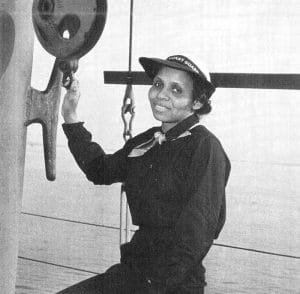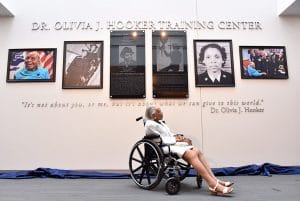Born in Tulsa, Okla., Hooker remembered the Tulsa Race Riots in 1921. “I was six years old when the riot came, but I had been in school for two years (at a little private school down the street) and so I could read, and I thought that everything in the Constitution pertained to me,” she said later. “I didn’t find out until that day — on the 31st of May — that I was left out. And I didn’t find that out until the riot had been going…I heard bullets on the roof and I said to my mother, ‘How can it be hailing when the sun is shining?’ and she said, ‘Come with me.’ She took me out from under the old oak table and took me to the window and looked through the blinds and she said, ‘Look upon the hill…do you see that thing?’ I said, ‘Yes,’ She said, ‘That’s a machine gun. You see the American flag on top of the gun?’ I said, ‘Yes.’ She said, ‘That means your country is shooting at you.’” By the time it was over, the Ku Klux Klan had burned down her father’s clothing store. Her father, wanting his children to get an education in a less violent community, moved the family to Columbus, Ohio; Hooker graduated from Ohio State University with a degree in education, and went to work in Columbus as a third grade teacher.

But during World War II, Hooker got advice from her friend Alex Haley (later a writer best known for Roots, a best-selling book that was turned into the most-watched-ever miniseries). Haley, who was serving in the U.S. Coast Guard, suggested Hooker join the military after President Franklin Roosevelt ordered the various female military corps be opened to minorities. Hooker applied for the Coast Guard’s Women’s Reserve, the SPARs (for Semper Paratus “Always Ready”). SPAR Recruiter Lt. Margaret Tighe said of Hooker, “She is to be admired for her initiative and courage. Solely on the basis of qualifications, Miss Hooker is one of the outstanding young women ever accepted for the SPARs and it is a pleasure to recommend her.” And, Lt. Tighe added, “She is the first Negro woman to be accepted by the SPARs, and is in full realization of this fact. She feels a sincere desire to serve and further feels that she is opening a field for the young women of her own race.” Hooker, by then 30 years old, was indeed the first black woman to enlist for active duty in the U.S. Coast Guard.

By the time the SPARs were disbanded in 1946, Hooker had earned the rank of Petty Officer 2nd Class. She used her G.I. Bill benefits to earn her Master’s degree in psychology from Columbia University, and a Ph.D. in psychology from the University of Rochester. She not only practiced as a school psychologist, but became an associate professor of psychology at Fordham University in New York, and also served as a director of the Kennedy Child Study Center in the Bronx. She retired in 2002 at 87, but apparently got bored: at 95, she joined the Coast Guard Auxiliary, and served as a volunteer in New York. “It’s not about you or me,” she said, “it’s about what we can give to this world.” Dr. Hooker received the American Psychological Association’s Presidential Citation in 2011, and was inducted into the New York State Senate Veterans’ Hall of Fame in 2012. And, the Coast Guard named the Dr. Olivia J. Hooker Training Center at their headquarters in Washington D.C. in her honor. She died at her home in White Plains on November 21, at 103.
